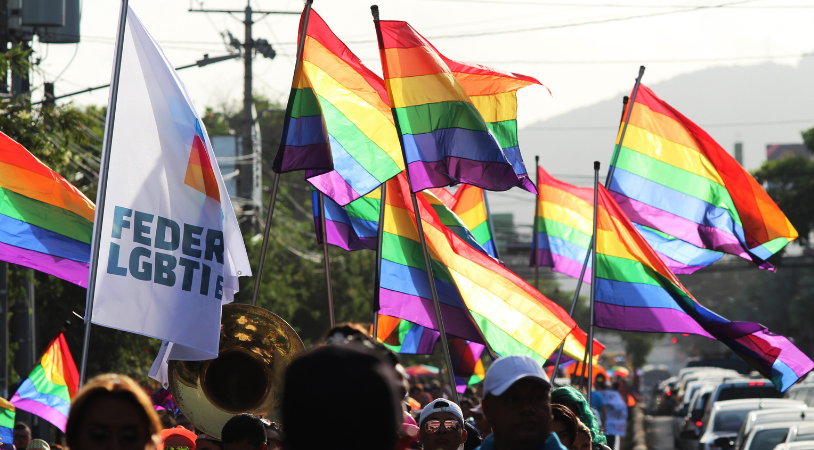LGBTI+ individuals are fighting for freedom and equality against the gender and identity impositions of capitalist society. However, this struggle faces systematic oppression, violence, and discrimination.
LGBTI+ individuals encounter numerous challenges as they try to carve out a space for themselves within the heteronormative system imposed by societal norms and the capitalist order. These issues are not only related to individual lives but also connected to deeper contradictions with the potential to transform social structures.
Imposition of Gender Roles: Restricting Individual Freedom
Society confines individuals to specific gender roles, limiting their freedom of self-expression.
Capitalist society attempts to maintain order by controlling gender and sexuality. This manifests in all areas, from family structures to the education system, from the workplace to the media. LGBTI+ individuals are excluded, stigmatized, and discriminated against for rejecting these imposed norms. For example, trans individuals often struggle to find employment; they are denied positions that match their identity and are deprived of basic rights such as wearing clothes appropriate to their gender or using their chosen name. This prevents them from achieving economic independence and leads to social exclusion.
Such discriminatory practices result from the capitalist system’s efforts to mold individuals into standard templates. Yet, a truly free society must create a space where individuals can express and exist as they wish. The current system, however, continually imposes restrictions on LGBTI+ individuals’ freedom through oppressive mechanisms.
Precarious Labor and Discrimination
LGBTI+ individuals often find themselves in insecure jobs, making them economically and socially vulnerable.
The capitalist system reinforces the exploitation of labor through sexist and homophobic discrimination. For instance, many trans individuals, unable to find employment, are forced into sex work, placing them in precarious working environments and at constant risk of violence. The state and society’s failure to address this issue clearly shows how LGBTI+ individuals are marginalized by the system.
In Turkey, for example, a trans person may be fired from a job solely due to their identity, often without legal protection or social security. This reveals the reality of a capitalist system that shapes the workforce based on certain norms: individuals who do not conform to heteronormativity are marginalized and forced to live in economic insecurity.
Fighting Violence and Discrimination: The State’s Repressive Mechanisms
LGBTI+ individuals face not only societal oppression but also direct violence from the state.
The state’s security forces, police, and judicial mechanisms often serve as tools of repression rather than justice for LGBTI+ individuals. For example, Pride Parades are blocked in many countries, and participants are subjected to police violence. In 2015, police in Istanbul intervened in the Pride Parade with water cannons and tear gas, exemplifying the state’s oppression of LGBTI+ identities in public spaces.
LGBTI+ individuals also face indirect state violence in their daily lives. Information about gender identity and sexual orientation is either censored or completely misrepresented in the education system. LGBTI+ students are labeled and bullied in schools, while teachers and administrators turn a blind eye. This is another example of how the state limits LGBTI+ individuals’ presence in education and public life.
The Family Institution and Capitalist Control
LGBTI+ individuals are excluded from the family institution, which is considered one of society’s foundational pillars, and subjected to social exclusion.
In capitalist society, the family serves as both an economic and social control structure. LGBTI+ individuals, because they do not fit into the heteronormative family structure, are often rejected or oppressed by this institution. Many LGBTI+ youths are thrown out of their homes when they disclose their sexual orientation or gender identity, leaving them vulnerable both materially and emotionally.
The capitalist order uses the family as an ideological tool, ensuring that individuals are raised in accordance with the social system. However, when LGBTI+ individuals fall outside this system, they are confronted with the system’s nature of either ignoring or oppressing them. This oppression poses a serious obstacle not only to individual lives but also to movements fighting for a free society.
The Class and Social Dimension of the Struggle
The oppression LGBTI+ individuals face is a reflection of the deep structural problems of capitalist society.
In capitalist society, oppression occurs not only on an economic level but also through social norms. The discrimination faced by LGBTI+ individuals is not merely an attack on individual identities but part of capitalism’s broader control mechanisms. Individuals who do not conform to societal norms are marginalized, allowing the system to continue accumulating capital. However, a free and equal society must enable individuals to express themselves as they are, without repression of their gender or sexuality.
The Fight for Freedom Everywhere
The struggle for freedom by LGBTI+ individuals should not only focus on gender and identity but also critique the broader social and economic system.
The issues faced by LGBTI+ individuals are part of the broader struggle against the capitalist system’s general functioning and oppressive mechanisms. Resistance to society’s imposed gender norms and the state’s repressive policies is not just an individual rights struggle but a collective fight for a freer and more equal society. This struggle must be expanded as a freedom movement aiming at transforming social structures and the capitalist order.
